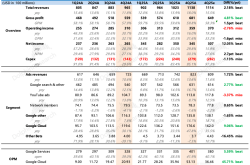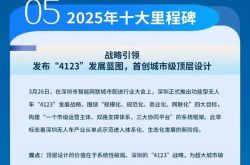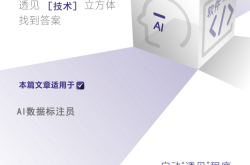AI Spreadsheets Ignite New Battleground: Tech Giants Vie for Dominance in 'Next-Gen Office' Space
![]() 07/18 2025
07/18 2025
![]() 482
482

The rivalry between DingTalk, Feishu, and WeChat Work in the realm of AI spreadsheets epitomizes Alibaba, ByteDance, and Tencent's battle for supremacy in AI-driven business solutions. It also highlights the relentless pursuit of market dominance by tech giants, where every segment is fiercely contested. Original Tech News AI New Tech Team
Recently, Tencent, Alibaba, and ByteDance have reignited competition in the B-end collaborative office space. Alibaba's DingTalk kicked off the race on July 8th with the launch of a new AI spreadsheet. The next day, at the 2025 Feishu Infinite Future Conference, Feishu unveiled its next-generation AI-powered multi-dimensional spreadsheets. Following suit, Tencent's WeChat Work released versions 4.1.36 and 4.1.38, further enhancing the AI capabilities of its smart spreadsheets.
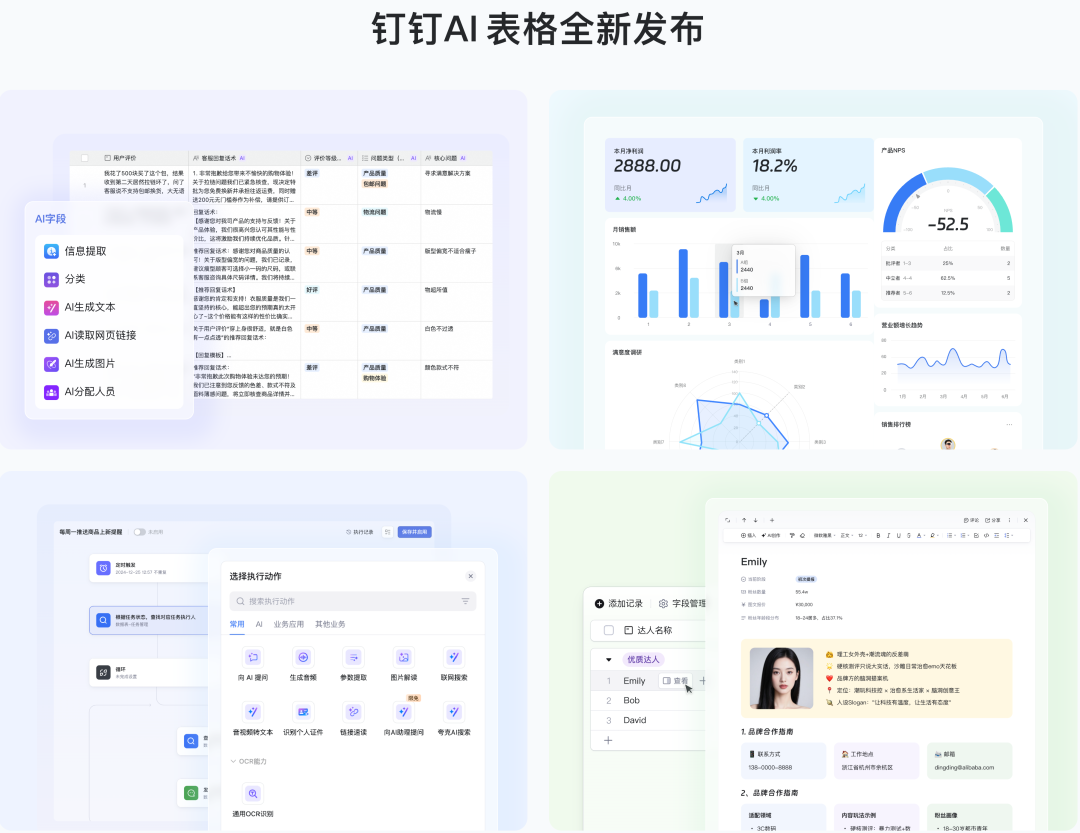
Amidst the surge in popularity of large AI models and the global explosion of AI applications, these three companies, deeply entrenched in the collaborative office sector, have unanimously introduced AI spreadsheets. Despite their unique technological foundations and detailed functionalities, the fact that all three are converging on the same vertical track at similar junctures underscores the intensity of the competition, with none willing to cede ground. In fact, whether it's vertical competition in collaborative offices or user acquisition in instant retail, the underlying rationale behind tech giants' fierce rivalry in both B-end and C-end markets is akin: in an era of stock competition, leading enterprises' business reach gradually expands, and in their evolution towards super leadership, every niche must be fiercely contested. The principle of 'falling behind means getting hit' remains ever relevant in the business world.
01
Three Titans Clash for the Crown of 'Next-Generation Office'

DingTalk, Feishu, and WeChat Work's forays into AI spreadsheets can be seen as a reimagining of traditional application tools (spreadsheets) infused with AI, aligning with the current trend of enterprise innovation and competition. From healthcare to retail, transportation to education, and even in the more esoteric realm of content creation, 'AI+' is no longer a novelty. DingTalk describes its new AI spreadsheet as an 'entry point for creating new applications in the AI era,' treating each spreadsheet cell as an AI access point. Concurrently, it introduced the 'spreadsheet as document' function, seamlessly integrating documents into data tables for the first time. Each row of the spreadsheet functions as an independent document, enabling users to freely input and view information at a glance, thereby expanding the application scenarios of AI spreadsheets. According to DingTalk, the new AI spreadsheet enables AI to seamlessly integrate into enterprise communication, collaboration, and processes, significantly boosting productivity. Feishu's new generation of multi-dimensional spreadsheets has witnessed significant enhancements in AI and system-building capabilities, aimed at unleashing the potential of every employee using the system, thereby providing enterprises with a competitive edge. At the Infinite Future Conference, where the new multi-dimensional spreadsheets were unveiled, Feishu also released upgraded versions of multiple AI products, including Knowledge Q&A, AI Meetings, Feishu Aily, and Feishu Miaoda.
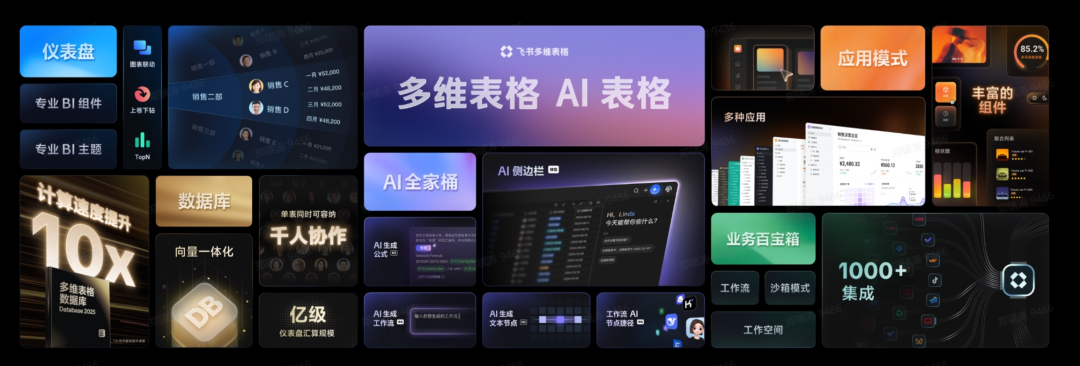
Another player, WeChat Work, has also upgraded its smart spreadsheets with a focus on AI capabilities. In the latest version, the smart spreadsheet has enhanced its 'AI Field' functionalities, including batch tagging, classification, image understanding, and custom fields, simplifying business analysis and efficiency improvement.
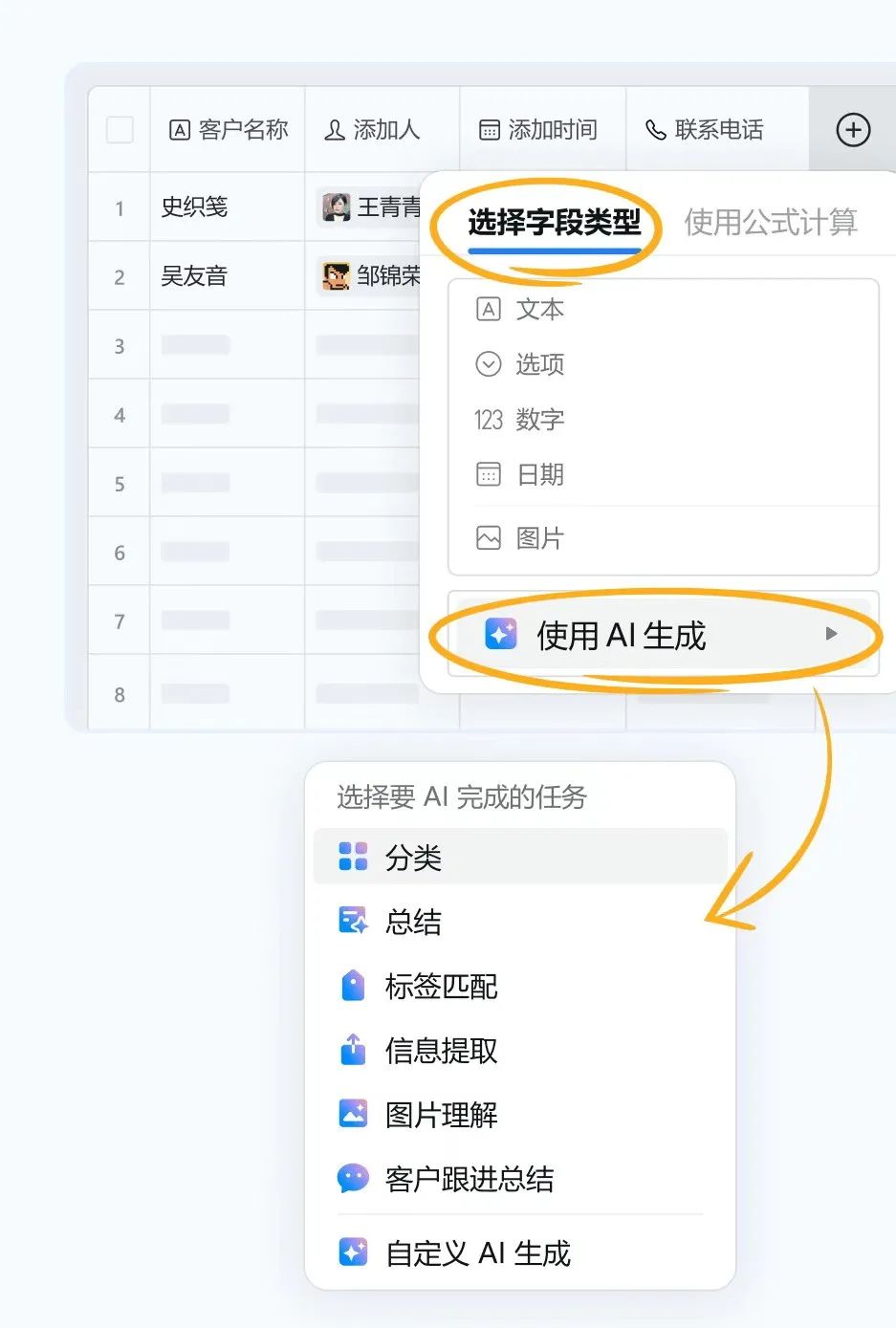
Despite the nuanced differences in technological foundations and functionalities, the upgrades to multi-dimensional/smart spreadsheets by these three companies can be seen as AI-driven functional iterations aimed at improving enterprise users' operational efficiency. Why have all three chosen to focus on AI spreadsheets? For DingTalk, the group needs it to defend its AI-to-B gateway. The AI spreadsheet marks a significant move after Wu Zhao's return to prove his mettle. For Feishu, CEO Xie Xin positions the AI-upgraded multi-dimensional spreadsheet as the 'fourth pillar beyond Word, Excel, and PPT in the office suite.' For WeChat Work, although the sense of urgency in competition is slightly muted, it does not want to miss out on the opportunity to apply AI in B-end office scenarios. With converging application scenarios, becoming the Office of the AI era may be a shared aspiration. Indeed, since the advent of ChatGPT, the AI revolution has become an industry consensus. DingTalk, Feishu, and WeChat Work's advancements in AI spreadsheets are part of Alibaba, ByteDance, and Tencent's broader AI strategies. As early as 2023, Alibaba had already outlined an 'AI-driven' strategy. In their annual report letter to shareholders, Alibaba Group Chairman Joseph Tsai and CEO Simon Wu highlighted that the next decade's biggest growth and variability will stem from AI. DingTalk, as a crucial entry point for Alibaba's AI-to-B strategy, bears the group's aspirations for B-end business expansion. ByteDance's AI journey dates back to 2016. In November 2021, new CEO Liang Rubo sent an email to all employees announcing organizational adjustments and the establishment of six major business segments, with AI strategic goals empowering all lines. With AI's strategic position continually elevating within the group, ByteDance has now forged a comprehensive AI ecosystem spanning from C-end to B-end. In the B-end space, with Volcano Engine as the core, it transforms internally accumulated AI capabilities into enterprise-level solutions, with Feishu being a key component. Tencent's AI layout was initially more conservative but has entered a phase of heavy investment since the second half of last year, fueled by the AI trend brought about by DeepSeek's popularity. Tencent's AI strategy now accelerates AI penetration across all products based on a 'self-developed + open-source' multi-model approach. WeChat Work serves as a strategic entry point for Tencent's AI-to-B aspirations, providing Tencent's AI (especially large models) with abundant real-world enterprise scenarios for validation and iteration. The above insights reveal that the three tech giants' AI layouts are large-scale, long-term strategic moves in line with the broader industry trends. As one facet of their overall strategic vision, AI spreadsheets demonstrate their resolve to compete for AI-to-B dominance.
02
The Race to Capture Users' Hearts and Minds

A salient fact is that in the AI-to-B application landscape, the competition between Alibaba, ByteDance, and Tencent is fierce, with each leveraging group resources to empower their enterprises and gain differentiated advantages. However, since the fundamental enterprise application scenarios of multi-dimensional/smart spreadsheets are similar, despite their AI-driven enhancements, they are still far from disruptive innovations that could significantly alter application landscapes. The lack of disruptive differentiation in usage scenarios prompts these companies to focus on user acquisition beyond technological advancements, aiming to be the first to capture the hearts and minds of enterprise users. In 2023, DingTalk led in user scale, followed by WeChat Work, with Feishu in third place. Although none have disclosed specific user scales since then, commercial revenue figures suggest that the battle for users remains intense. Feishu boasts an impressive roster of star clients, including AI industry heavyweights like DeepSeek, China's 'Six Little Tigers' of large AI models, and Horizon Robotics. In the high-profile new energy vehicle sector, Xiaomi, NIO, Xpeng, and Li Auto also use Feishu. Among the scientific and technological innovation forces, DingTalk enjoys the support of star companies like Strong Brain Technologies and Unitree Robotics.
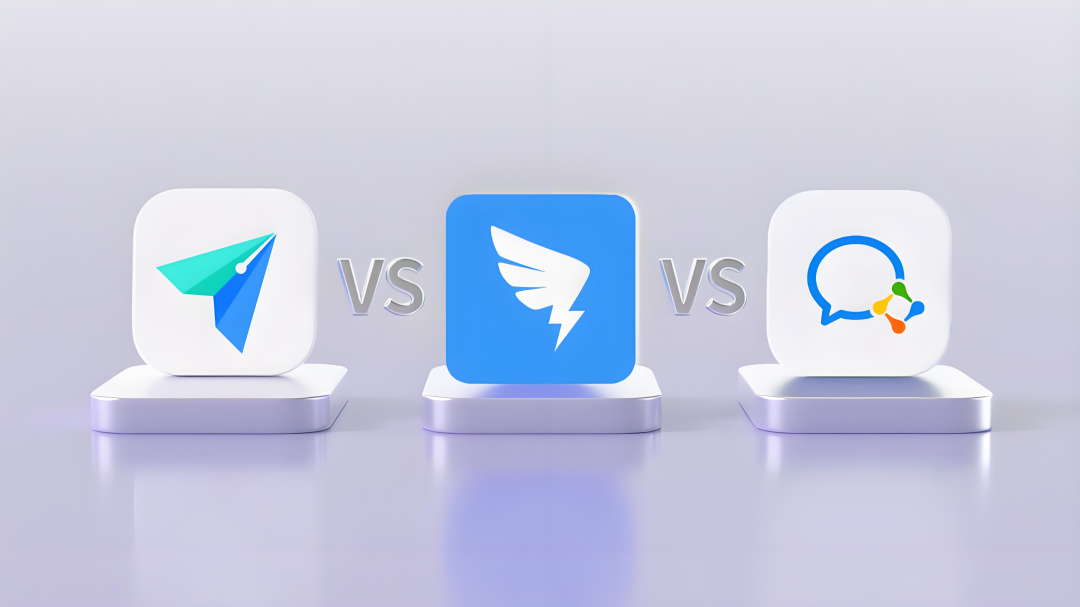
Image/AI Created
According to reports, multiple retail and consumer brands such as Eifini, HXS, Proya, and Jasmine Milk Tea have migrated from DingTalk to Feishu. New energy vehicle makers XPeng and Li Auto have also switched from DingTalk to Feishu. Conversely, Best Express, Lierda, and Weimai have moved from Feishu to DingTalk. Additionally, a LatePost report revealed that DingTalk launched a 'Turn the Page Plan' last year, incentivizing sales representatives with bonuses for acquiring Feishu's clients. Relying on the WeChat ecosystem, WeChat Work enjoys inherent advantages but appears relatively subdued in the user acquisition battle compared to the dynamic interplay between DingTalk and Feishu. Its last widely publicized external statement dates back to 2024 when Li Zhifeng, Vice President of WeChat Work, revealed at a partner exchange meeting that 'WeChat Work is confident of being the first to achieve profitability among the three major players (WeChat Work, DingTalk, Feishu) this year.' However, this does not imply complacency; the recent AI upgrade to smart spreadsheets in its new version reflects its determination not to fall behind. Pricing for multi-dimensional/smart spreadsheets also sees competition. DingTalk announced in June this year that multi-dimensional spreadsheets would be free, while Feishu offers a free basic version with a commercial version priced between 50 and 120 yuan per month. Responding to this, Feishu's Xie Xin told LatePost, 'Actually, some of DingTalk's charging points have become stricter, but they are better at promotion.' In comparison, WeChat Work's smart spreadsheets maintain a free basic version with some advanced versions being charged. Leveraging the extensive WeChat ecosystem, WeChat Work, despite its reserved stance in the three-way user acquisition battle, is not afraid of falling behind, and its commercial revenue maintains a growth trajectory. According to Tencent's Q1 2023 financial report, the group's enterprise service revenue, primarily represented by WeChat Work, achieved double-digit growth. In this race to capture users' hearts and minds, DingTalk and Feishu are locked in a fierce battle, while WeChat Work watches from the sidelines, albeit comfortably. However, with Alibaba, ByteDance, and Tencent's AI strategies continuously unfolding, the competition among the three in the collaborative office space is far from over.
03
The Essence of Expansion: Securing a Position for the Future

In essence, the rivalry between DingTalk, Feishu, and WeChat Work in the collaborative office space is part of Alibaba, ByteDance, and Tencent's broader strategy to compete for future discourse power. Besides vying for the hearts and minds of enterprise users in the B-end market, these tech giants have long been fiercely competing in the broader and more intense C-end market. For instance, in e-commerce, Alibaba's Taobao and Tmall are benchmarks for traditional shelf e-commerce. The rise of Douyin's content e-commerce has complicated the competitive landscape. As WeChat refocuses on its e-commerce business, competition among the three in this sector will intensify. In digital entertainment, Tencent's Tencent Video and Alibaba's Youku, representing the long-form video segment, have been impacted by short video platforms like Douyin and Hongguo Short Drama. In response, Tencent Video and Youku have started vigorously developing short dramas. In online literature, Tencent's China Literature, Alibaba's Shuqi Novel, and ByteDance's Tomato Novel are also locked in competition.

In the context of normalized competition, tracing back to the origins reveals a pivotal fact: the original businesses of the three tech giants were markedly distinct. Tencent began with instant messaging, Alibaba as a B2B e-commerce platform, and ByteDance with algorithmic news. Despite these differing starting points, Tencent, Alibaba, and ByteDance share a convergent mindset in the AI era. Beyond competing in AI spreadsheets, they are engaged in a race for large model tracks, exemplified by Tencent's Hunyuan, Alibaba's Tongyi, and ByteDance's Doubao large models, as well as agents and AI assistants built on these large AI models. Their AI layouts are at the cutting edge of the industry, encompassing both B-end and C-end markets. The core impetus behind their expansion from single businesses to diversified eco-groups is the intensifying stock competition and the gradual peaking of user traffic, prompting large enterprises to delve deeper into the value of existing users, inevitably encroaching on competitors' territories. This business expansion follows a logical progression: invading rivals' domains, safeguarding core business sanctuaries, fostering synergy within their business matrix, and vying for the next technological frontier. Notably, the large AI model, as the current trend, is crucial in capturing future technological entry points. Be it C-end AI assistants or B-end large models and collaborative offices, every terrain is fiercely contested.
History teaches us that there are no eternal monarchs, only titans of their time. The rationale behind Alibaba, Tencent, and ByteDance expanding their business scope and blurring boundaries is to place comprehensive bets on the "next decade," ensuring they do not lag behind their competitors.
References:
- Shixiang, "DingTalk Takes Feishu as a Target"
- Photon Planet, "Enterprise WeChat Does Not Earn Hard Money"
- Leifeng.com, "The New Battleground of the Internet: Wu Zhao's AI Spreadsheet Strategy"
- LatePost, "Exclusive Interview with Feishu CEO Xie Xin: Office Is a Great Product, and We Want to Be the Office of the New Era"

